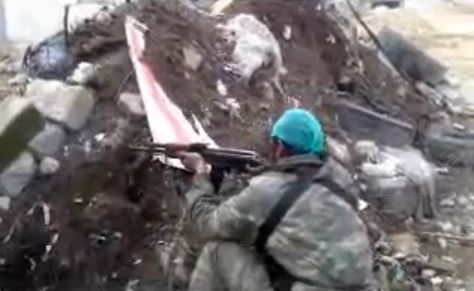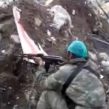
Chechen Insurgency Leader Doku Umarov Tells Chechens Not to Fight in Syria
Publication: Eurasia Daily Monitor Volume: 10 Issue: 59
By:

Over the past several months, various sources have raised the issue of Chechen involvement in the armed uprising in Syria. Few doubt that Chechens have been present in the conflict-ridden country. The question is how central their position is in the anti-Assad armed opposition.
First of all, it needs to be emphasized that no Chechens went directly from Chechnya specifically to fight in Syria. Most of the Chechens now fighting in Syria went to the Middle East on the pretext of studying in Islamic institutions. Egypt and Syria were the primary destination for their Islamic studies. As the situation unfolds in Syria, participation of Chechens from Western countries is also becoming important.
Why are Chechens from Western countries going to fight in Syria and not in Chechnya? Primarily, the opportunities for such people to travel to Chechnya are limited by strict border controls imposed by the Russian security services and the republican government of Ramzan Kadyrov. In addition, fighting in Chechnya causes problems not only for the person who is actually fighting, but also for a whole range of people connected to him through networks of family and friends. Traveling to Syria does not entail all these complications and it is easy to undertake if permitted by Turkey. Chechens from Western countries tended to be among the first victims in the Syrian war (www.youtube.com/watch?v=s4PMewZHOXc). They have not experienced war in Chechnya, and their arrival in Syria is more about boyish defiance than a call of duty. In Chechnya itself, when people have funerals for those who died in Syria, they try to conceal the fact that their relatives were killed in the Syrian fighting (www.radiomarsho.com/content/syria-chechens-war-jihad/24912272.html). In February 2013 alone, 17 North Caucasians reportedly were killed around the Syrian city of Aleppo (https://newsland.com/news/detail/id/1147813/).
There are currently several Chechen groups in Syria. Kataib Muhajirin, Jeish Muhammad and Kataib Hattab are the three biggest groups in which Chechens have commanding positions. In March 2013, all three groups decided to merge into the Army of Muhajirs and Ansars (a.k.a. Jeish Muhajirin va Ansar) (www.facebook.com/kataibmuhajirin). The commanders of Jeish Muhammad and Kataib Hattab pledged allegiance to Kataib Muhajirin’s emir, Umar Shishani. The united group of Chechen militants operates primarily around Aleppo. According to a North Caucasian jihadi group source, the group is comprised of up to 1,000 people (www.kavkazjihad.com/ru/novosti/umma/siriya-prisyaga-sirijskikh-modzhakhedov-amiru-armii-mukhadzhirov-i-ansarov-umaru-shishani.html?utm_source=twitterfeed&utm_medium=twitter). Ascertaining the actual number of Chechens fighting in Syria is difficult. If one scales down the assertions made by rebel websites for propagandistic reasons, one can probably assume that the group has several hundred members fighting in Syria. Moreover, it appears that the leaders of the militants of the so-called Chechen groups are Chechens from Georgia. They are not hard to recognize as Georgian Chechens have a specific accent found only in Georgia’s Pankisi Gorge (https://chechenews.com/developments/11433-1.html).
Estimates that up to 6,000 Chechens are in Syria are absurd (https://inosmi.ru/asia/20130309/206759096.html). Speaking on ITON.TV, Yaakov Kedmi, the former head of Nativ, an Israeli liaison organization that maintained contact with Jews living in the Eastern Bloc during the Cold War and encouraged them to immigrate to Israel, expressed doubt about the presence of thousands of Chechens in Syria. Kedmi contends that while there may be some Chechens and other Muslims from Russia in Syria, there cannot be 6,000 of them (www.youtube.com/watch?v=voJn3PY076I). He also asserts that Syria is not a training ground used by the Chechens to prepare for warfare in the North Caucasus because they already received the necessary fighting skills in Chechnya.
It is likely also not justified to talk about this group fighting in Syria as a “Chechen” group. While under the command of a Chechen, Umar Shishani, there are fighters from almost all ethnic groups of the North Caucasus, including Chechens, Ingush Dagestanis and even Ossetians (https://kavkazcenter.com/russ/content/2013/02/22/96378.shtml). The participation of Ossetians in the Syrian conflict became public after information emerged about injuries and deaths among Ossetian students who went to Egypt for Islamic studies (www.segodnia.ru/content/118129). The fact that several Ossetians are involved in the hostilities in the Middle East is used by the authorities in North Ossetia as an instrument of pressure on the Spiritual Board of North Ossetian Muslims, the main Muslim organization in the republic. North Ossetian mufti Hajimurat Gatsalov believes a war is being waged in the republic not against Islamists and radicals, but against Islam itself (https://ansar.ru/society/2013/03/23/38976).
It also turns out that ethnic Tatars are taking part in the war in Syria, which will have an impact on Tatar actions against Russia in the future. One source alleged that there are 200 Tatars fighting in the Syrian war (www.youtube.com/watch?v=o9oK9BBOufg).
The paradox of Chechen participation in hostilities in Syria is that both Chechen officials in Grozny and Doku Umarov, the head of the self-proclaimed Islamic Emirate, disapprove of it. Umarov says that Chechens should not get involved in the Syrian conflict because they have unresolved issues in the North Caucasus (YouTube video no longer available, original link here www.youtube.com/watch?v=xyACOPqsdjA&feature=player_embedded). However, this is likely to have little impact on those Chechens fighting in Syria since Umarov is not their leader.
The Chechen factor is not unimportant for the Syrians themselves. The image of the Chechen fighter who fought the mightiest army in the world is a significant morale booster for the Syrian opposition. Russian nationalists and patriots, such as the notorious Russian TV personality Mikhail Leontyev and the writer Alexander Prokhanov, who visited Syria, verified this based on their own personal experience. Their video recordings made in Syria showed graffiti on walls saying “Chechnya, Save Syria,” “Chechens, Rise,” “Death to Russia, Long Live Chechens,” “We Started in Syria, We Will Finish in Russia,” “Where Are You, Chechens?” and so on (www.youtube.com/watch?v=o9oK9BBOufg). The image of an invincible fighter helps Chechens remain in leadership positions and stay popular in Syria amid the confusion there.
Thus, it can be concluded that the war in Syria is likely to have negative consequences for Russia in the nearest future. As those who fought in Syria come back to the North Caucasus, they will have more connections with the outside world and more opportunities to fight Russia in the region.




